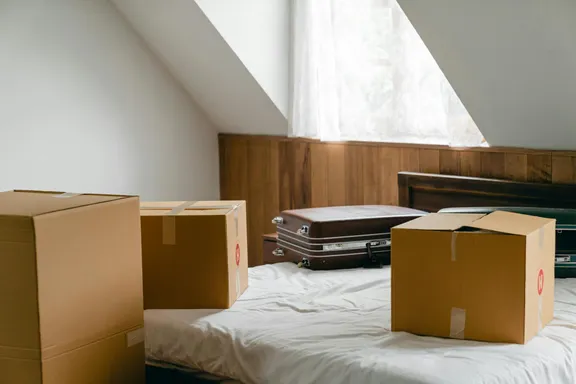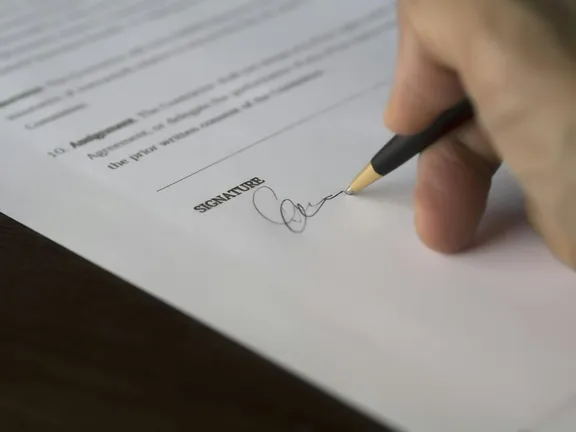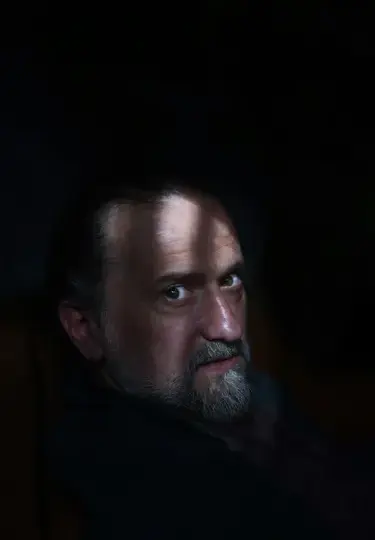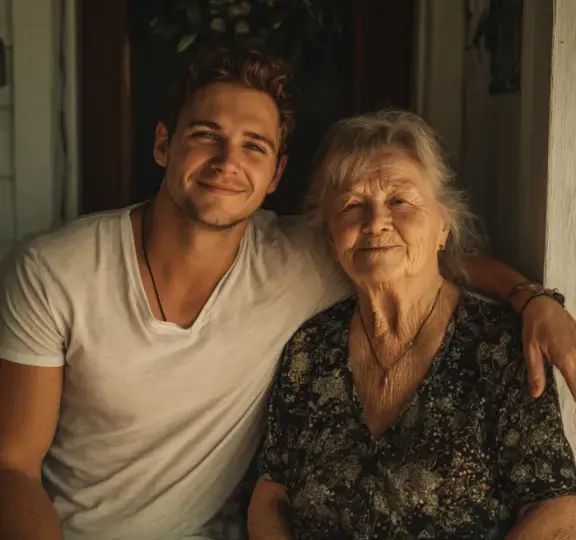My sister-in-law abandoned her son with me — and for twenty-two years, I raised him as my own. Over those two decades, we built a life together filled with quiet routines, small joys, and the kind of love only family can create. I believed the past was behind us, buried deep where it couldn’t hurt anymore. But then, one day, his father returned unexpectedly, bringing with him a secret plan that left us both shocked and unsettled. My name is Margaret, and looking back, I never could have imagined my life unfolding this way.
I wasn’t always the strong woman people saw today. For most of my life, I was the quiet school librarian—the kind who cherished routine and preferred the soft rustle of pages over loud conversations. I was known around town for my Friday tradition of baking blueberry muffins and knitting baby blankets for every new child baptized at our church. Life was steady and predictable.
But everything changed when I lost my husband to cancer at the age of 42. His death left a cavern of grief in my life, and suddenly, my entire world became my only daughter, Anna. She was my reason to keep going each morning, my steadfast light in the darkness. Anna had my stubbornness and her father’s warm smile. By the time she was 27, she was thriving—working in marketing, living in a cozy home just down the street, and raising her son Ethan, my beloved grandson. Ethan was three years old, with soft curls and big brown eyes that shone with curiosity.

Anna often told me, “Mom, you worry too much. Ethan’s going to be just fine.” But no amount of reassurance could prepare me for how quickly life can shatter.
I was 53 when I received the call about the plane crash. The weather was terrible that day—a rain-soaked flight ended in tragedy due to mechanical failure. There were no survivors. Just moments before, I had been laughing with Anna on the phone about a silly thing Ethan said at preschool. Then, in an instant, she was gone.

I remember collapsing onto the kitchen floor, the mug in my hand shattering against the tile beneath me. I didn’t even notice the glass cutting into my palm—I was too consumed by disbelief. I kept whispering her name as if repeating it over and over could undo the devastation. Ethan, only three, didn’t understand what death meant, but he knew something had changed. He clung to me desperately, his small fingers tangled in my sweater, cheeks flushed with confusion and sadness.
Each night, I held him close and told him stories about his mother, assuring him of her love and presence in spirit. I believed that with time, we would heal together. But what I didn’t know then was that another heartbreak was waiting for us—one far worse than loss.
Just weeks after Anna’s funeral, while trying to maintain some semblance of normalcy in her house, there was a knock at the door. I opened it to find Mark, my son-in-law, standing awkwardly on the porch, Ethan’s little suitcase by his feet. He looked pale and restless, eyes darting nervously. Without stepping inside, he told me flatly, “I can’t do this, Margaret. I’m still young. I want to live my life. You take Ethan. You’ll manage.”

My throat tightened. “Mark… he’s only three.”
He shrugged, showing no remorse. “I’ve met someone. I’m moving away. This isn’t the life I want.”
I gripped the doorframe to steady myself. “Are you serious? You’re his father.”
He didn’t answer. Without another word, he turned, walked down the steps, got into his car, and drove off. No hug. No goodbye. Just gone. Ethan, unaware of the gravity of the moment, was busy dragging a worn stuffed rabbit across the porch, humming a tune.
I picked him up and pressed a gentle kiss to his forehead. “It’s just you and me now, baby,” I whispered.
And it was true. From that moment on, we were all each other had.
We stayed in Anna’s small house—the two-bedroom with a linoleum kitchen and a yard that constantly needed tending. Though modest, it was filled with memories. Somehow, it felt like Anna was still there—in the walls, in the scent of her lavender soap, and in the laughter that echoed from Ethan’s bedroom.
Money was tight. To make ends meet, I took evening shifts cleaning medical offices and early mornings baking at Mrs. Sutton’s bakery downtown. I came home exhausted, my feet aching, flour in my hair, but Ethan’s giggles made every hardship worthwhile. I wanted him to experience childhood as fully as possible: birthday parties with homemade cakes, backyard camping adventures, and Saturday morning cartoons with pancakes.
He never asked why his father didn’t call. By the time he was six, he didn’t even mention Mark anymore.
Ethan grew to become my shadow, always eager to help. “Grandma, I’ll carry the groceries. You rest,” or “Want me to fold the laundry like you showed me?” he’d say. Thoughtful, sharp, and full of heart, he blossomed into a man I couldn’t have been prouder of.

By the time Ethan turned 25, he had built a life of his own—far beyond what I ever imagined. At first, he spoke little of his accomplishments, simply mentioning a promotion here and there. Then one day, he came home carrying a folder, sat across from me at the kitchen table, and said, “Grandma, this house is ours now. I don’t want you living alone anymore. Your health isn’t what it used to be. I want you taken care of, at least until I can find a place nearby.”
I frowned, brushing flour off my apron. “Ethan, you’re a grown man. You need your own space. I don’t want to be in the way.” He smiled gently and shook his head. “You’re never in the way. You’re the reason I am who I am. And I want us to live under the same roof again. You’ve always been there for me—now it’s my turn.” I couldn’t say no.
We moved to a new home—a far cry from the old one. White stone walls, long hallways, floor-to-ceiling windows, and a gleaming kitchen with appliances I didn’t even know how to use. The backyard looked like it belonged in a magazine. There was even staff to help, which made me uncomfortable at first. I kept trying to do everything myself—wash dishes, sweep floors, make my bed—but Ethan gently reminded me, “Grandma, you’ve worked enough for three lifetimes. Let someone take care of you now.”
Eventually, I stopped resisting. I had a cozy suite with my own bathroom and a balcony where I drank tea each morning, a book in hand. Ethan checked in every evening, tired from work but always smiling. “Did you eat? Do you need anything?” he’d ask.
For the first time in decades, I let myself breathe. We were okay.
The old house still belonged to us, technically. But time hadn’t been kind to it. The paint peeled, wood warped, weeds choked the walkway. It looked like a haunted relic from a past life.
We talked about selling it, but Ethan always said, “Let’s give it time. I’m not ready to let go.”
Neither was I.
Then came the call from Mrs. Palmer, our old neighbor. “Margaret, you won’t believe this,” she said quietly. “Mark’s back.”
My stomach dropped.
Mark—the man who had walked away from his family twenty-two years ago—had returned. According to Mrs. Palmer, he arrived in a beat-up car, shocked by the state of the house. He kept pacing, asking what happened to Ethan and me. Mrs. Palmer didn’t reveal anything about us, telling him she hadn’t seen us in years.
Ethan overheard the conversation and took the phone. “If he comes back, tell him to come here,” he said firmly. “I want him to look me in the eye.”
I was stunned. “Are you sure? You don’t owe him anything.”
Ethan nodded. “I know, Grandma. But I need to hear why. He needs to see what he lost.”
Two days later, Mark showed up at our driveway. He looked worn—thinner than I remembered, clothes threadbare, hair streaked with gray. But it wasn’t his appearance that caught me off guard. It was the smugness in his eyes.
He strutted around the front lawn, inspecting the polished porch railings and neat flower beds. “Well, well,” he said, voice dripping with false charm. “Son, you’ve done well. I’m impressed.”
Ethan stiffened at the word “son,” but said nothing.
Mark then pulled out an envelope, dropping it near Ethan’s feet. Inside was a legal document, claiming co-ownership of the old house, the property Mark insisted was partly his despite abandoning us.
He said, “Sign this, and I regain my rights. I’ll take the ‘ruins’ off your hands. You keep the glory.”
Ethan looked at the paper calmly. “That house is more than wood and nails. It’s where I grew up, where Grandma taught me to ride my bike, where I fell asleep to her stories. It belongs to us, not you.”
Mark’s smile vanished.
“You owe me. Without me, you wouldn’t exist,” Mark snapped.
Ethan’s eyes hardened. “Without Grandma, I wouldn’t have survived. You gave me life, then left. She gave me everything else.”
He returned the envelope and stepped back. “There’s no place for you here—not in this house, not in my life.”
Mark was speechless. I didn’t say a word. We closed the door behind us.
For a long moment, I felt disbelief and quiet triumph.
Mark had returned not to make amends, but to make demands. But family isn’t defined by who walks away. It’s defined by who stays.
That night, Ethan and I sat in the sunroom. He was sketching plans to restore the old house. “You really want to do this?” I asked.
“It’s worth it,” he said softly. “That house is history. It’s where I learned to be loved. I want to bring it back to life.”
I smiled through tears, knowing that no matter what had been lost, we still had each other.
Weeks later, Mrs. Palmer called again. “Mark drove by one more time, but didn’t stop. Just looked at the house and left.”
I felt no anger—only pity.
Mark had spent a lifetime running—from responsibility, from love, from being a father. When he came back, he found nothing waiting for him. No welcome, no second chance—just a locked door that would never open.
Ethan and I visited the old house together, planning its restoration. Walking through the rooms, we remembered the past but looked toward the future.
That house might be old and worn, but it held the memories that built our family.
And in the end, it was Ethan and me—just as it always had been.
My sister-in-law abandoned her son with me — and for twenty-two years, I raised him as my own. Over those two decades, we built a life together filled with quiet routines, small joys, and the kind of love only family can create. I believed the past was behind us, buried deep where it couldn’t hurt anymore. But then, one day, his father returned unexpectedly, bringing with him a secret plan that left us both shocked and unsettled. My name is Margaret, and looking back, I never could have imagined my life unfolding this way.
I wasn’t always the strong woman people saw today. For most of my life, I was the quiet school librarian—the kind who cherished routine and preferred the soft rustle of pages over loud conversations. I was known around town for my Friday tradition of baking blueberry muffins and knitting baby blankets for every new child baptized at our church. Life was steady and predictable.
But everything changed when I lost my husband to cancer at the age of 42. His death left a cavern of grief in my life, and suddenly, my entire world became my only daughter, Anna. She was my reason to keep going each morning, my steadfast light in the darkness. Anna had my stubbornness and her father’s warm smile. By the time she was 27, she was thriving—working in marketing, living in a cozy home just down the street, and raising her son Ethan, my beloved grandson. Ethan was three years old, with soft curls and big brown eyes that shone with curiosity.

Anna often told me, “Mom, you worry too much. Ethan’s going to be just fine.” But no amount of reassurance could prepare me for how quickly life can shatter.
I was 53 when I received the call about the plane crash. The weather was terrible that day—a rain-soaked flight ended in tragedy due to mechanical failure. There were no survivors. Just moments before, I had been laughing with Anna on the phone about a silly thing Ethan said at preschool. Then, in an instant, she was gone.

I remember collapsing onto the kitchen floor, the mug in my hand shattering against the tile beneath me. I didn’t even notice the glass cutting into my palm—I was too consumed by disbelief. I kept whispering her name as if repeating it over and over could undo the devastation. Ethan, only three, didn’t understand what death meant, but he knew something had changed. He clung to me desperately, his small fingers tangled in my sweater, cheeks flushed with confusion and sadness.
Each night, I held him close and told him stories about his mother, assuring him of her love and presence in spirit. I believed that with time, we would heal together. But what I didn’t know then was that another heartbreak was waiting for us—one far worse than loss.
Just weeks after Anna’s funeral, while trying to maintain some semblance of normalcy in her house, there was a knock at the door. I opened it to find Mark, my son-in-law, standing awkwardly on the porch, Ethan’s little suitcase by his feet. He looked pale and restless, eyes darting nervously. Without stepping inside, he told me flatly, “I can’t do this, Margaret. I’m still young. I want to live my life. You take Ethan. You’ll manage.”

My throat tightened. “Mark… he’s only three.”
He shrugged, showing no remorse. “I’ve met someone. I’m moving away. This isn’t the life I want.”
I gripped the doorframe to steady myself. “Are you serious? You’re his father.”
He didn’t answer. Without another word, he turned, walked down the steps, got into his car, and drove off. No hug. No goodbye. Just gone. Ethan, unaware of the gravity of the moment, was busy dragging a worn stuffed rabbit across the porch, humming a tune.
I picked him up and pressed a gentle kiss to his forehead. “It’s just you and me now, baby,” I whispered.
And it was true. From that moment on, we were all each other had.
We stayed in Anna’s small house—the two-bedroom with a linoleum kitchen and a yard that constantly needed tending. Though modest, it was filled with memories. Somehow, it felt like Anna was still there—in the walls, in the scent of her lavender soap, and in the laughter that echoed from Ethan’s bedroom.
Money was tight. To make ends meet, I took evening shifts cleaning medical offices and early mornings baking at Mrs. Sutton’s bakery downtown. I came home exhausted, my feet aching, flour in my hair, but Ethan’s giggles made every hardship worthwhile. I wanted him to experience childhood as fully as possible: birthday parties with homemade cakes, backyard camping adventures, and Saturday morning cartoons with pancakes.
He never asked why his father didn’t call. By the time he was six, he didn’t even mention Mark anymore.
Ethan grew to become my shadow, always eager to help. “Grandma, I’ll carry the groceries. You rest,” or “Want me to fold the laundry like you showed me?” he’d say. Thoughtful, sharp, and full of heart, he blossomed into a man I couldn’t have been prouder of.

By the time Ethan turned 25, he had built a life of his own—far beyond what I ever imagined. At first, he spoke little of his accomplishments, simply mentioning a promotion here and there. Then one day, he came home carrying a folder, sat across from me at the kitchen table, and said, “Grandma, this house is ours now. I don’t want you living alone anymore. Your health isn’t what it used to be. I want you taken care of, at least until I can find a place nearby.”
I frowned, brushing flour off my apron. “Ethan, you’re a grown man. You need your own space. I don’t want to be in the way.” He smiled gently and shook his head. “You’re never in the way. You’re the reason I am who I am. And I want us to live under the same roof again. You’ve always been there for me—now it’s my turn.” I couldn’t say no.
We moved to a new home—a far cry from the old one. White stone walls, long hallways, floor-to-ceiling windows, and a gleaming kitchen with appliances I didn’t even know how to use. The backyard looked like it belonged in a magazine. There was even staff to help, which made me uncomfortable at first. I kept trying to do everything myself—wash dishes, sweep floors, make my bed—but Ethan gently reminded me, “Grandma, you’ve worked enough for three lifetimes. Let someone take care of you now.”
Eventually, I stopped resisting. I had a cozy suite with my own bathroom and a balcony where I drank tea each morning, a book in hand. Ethan checked in every evening, tired from work but always smiling. “Did you eat? Do you need anything?” he’d ask.
For the first time in decades, I let myself breathe. We were okay.
The old house still belonged to us, technically. But time hadn’t been kind to it. The paint peeled, wood warped, weeds choked the walkway. It looked like a haunted relic from a past life.
We talked about selling it, but Ethan always said, “Let’s give it time. I’m not ready to let go.”
Neither was I.
Then came the call from Mrs. Palmer, our old neighbor. “Margaret, you won’t believe this,” she said quietly. “Mark’s back.”
My stomach dropped.
Mark—the man who had walked away from his family twenty-two years ago—had returned. According to Mrs. Palmer, he arrived in a beat-up car, shocked by the state of the house. He kept pacing, asking what happened to Ethan and me. Mrs. Palmer didn’t reveal anything about us, telling him she hadn’t seen us in years.
Ethan overheard the conversation and took the phone. “If he comes back, tell him to come here,” he said firmly. “I want him to look me in the eye.”
I was stunned. “Are you sure? You don’t owe him anything.”
Ethan nodded. “I know, Grandma. But I need to hear why. He needs to see what he lost.”
Two days later, Mark showed up at our driveway. He looked worn—thinner than I remembered, clothes threadbare, hair streaked with gray. But it wasn’t his appearance that caught me off guard. It was the smugness in his eyes.
He strutted around the front lawn, inspecting the polished porch railings and neat flower beds. “Well, well,” he said, voice dripping with false charm. “Son, you’ve done well. I’m impressed.”
Ethan stiffened at the word “son,” but said nothing.
Mark then pulled out an envelope, dropping it near Ethan’s feet. Inside was a legal document, claiming co-ownership of the old house, the property Mark insisted was partly his despite abandoning us.
He said, “Sign this, and I regain my rights. I’ll take the ‘ruins’ off your hands. You keep the glory.”
Ethan looked at the paper calmly. “That house is more than wood and nails. It’s where I grew up, where Grandma taught me to ride my bike, where I fell asleep to her stories. It belongs to us, not you.”
Mark’s smile vanished.
“You owe me. Without me, you wouldn’t exist,” Mark snapped.
Ethan’s eyes hardened. “Without Grandma, I wouldn’t have survived. You gave me life, then left. She gave me everything else.”
He returned the envelope and stepped back. “There’s no place for you here—not in this house, not in my life.”
Mark was speechless. I didn’t say a word. We closed the door behind us.
For a long moment, I felt disbelief and quiet triumph.
Mark had returned not to make amends, but to make demands. But family isn’t defined by who walks away. It’s defined by who stays.
That night, Ethan and I sat in the sunroom. He was sketching plans to restore the old house. “You really want to do this?” I asked.
“It’s worth it,” he said softly. “That house is history. It’s where I learned to be loved. I want to bring it back to life.”
I smiled through tears, knowing that no matter what had been lost, we still had each other.
Weeks later, Mrs. Palmer called again. “Mark drove by one more time, but didn’t stop. Just looked at the house and left.”
I felt no anger—only pity.
Mark had spent a lifetime running—from responsibility, from love, from being a father. When he came back, he found nothing waiting for him. No welcome, no second chance—just a locked door that would never open.
Ethan and I visited the old house together, planning its restoration. Walking through the rooms, we remembered the past but looked toward the future.
That house might be old and worn, but it held the memories that built our family.
And in the end, it was Ethan and me—just as it always had been.